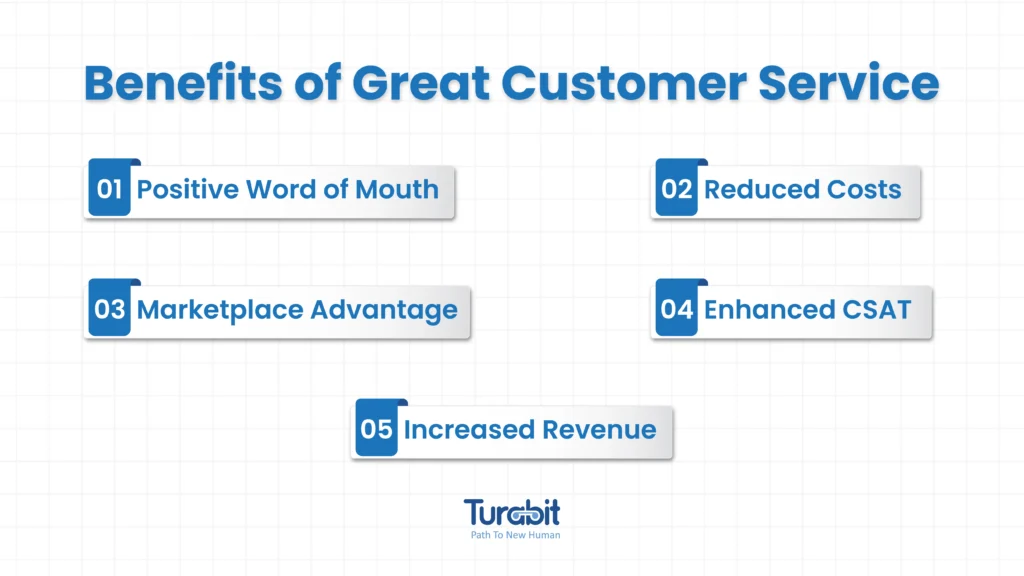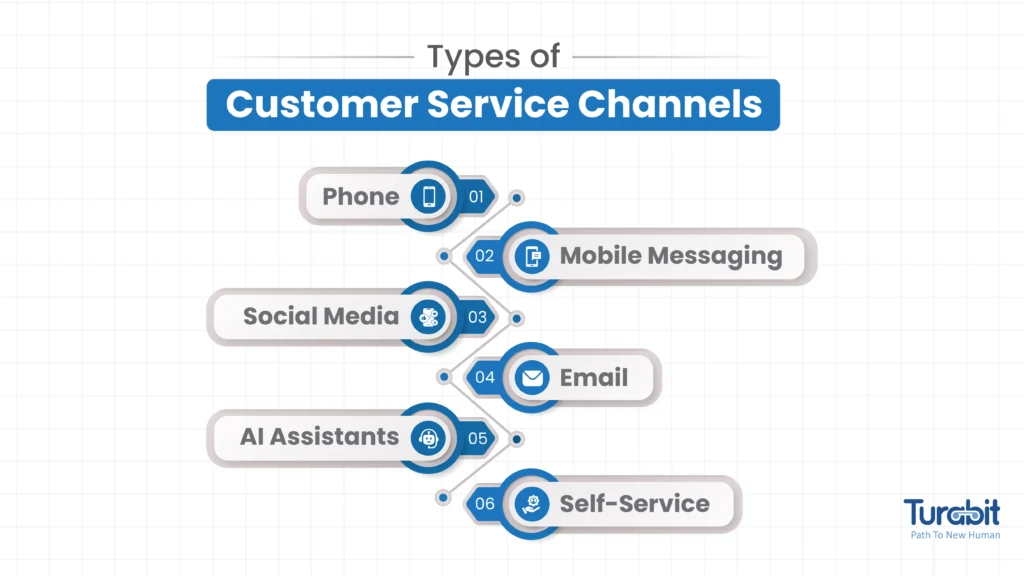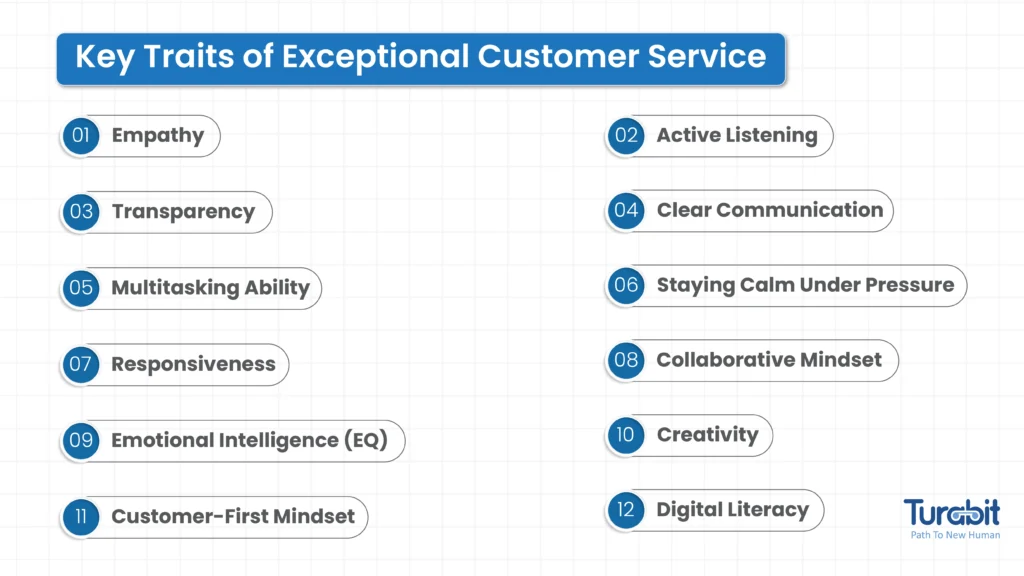What is customer service?
Customer service encompasses all the assistance and support you provide to customers from the moment they engage with your business until long after a purchase. It’s not just about resolving issues; it’s about creating an experience that leaves customers feeling valued, understood, and eager to return.
Think of it as the bridge between a successful transaction and a long-term relationship. We’ll dive into why top-notch customer service matters, how to evaluate your current service approach, and what it takes to level up your customer interactions.
The journey with a customer varies widely from person to person. Some customers might come in, make a purchase, and never need help again. Others may have questions, need guidance, or even return with complaints that require a thoughtful resolution.
The role of customer service in both cases is to not only meet their needs but also to ensure that every touchpoint strengthens the bond between your brand and the customer. Whether a quick one-time interaction or a long-term relationship, customer service should always aim to maximize the value of each encounter, turning challenges into opportunities to impress and build loyalty.
Customer service comes in many forms, live chat, phone support, email responses, and self-service portals, to name a few. But the real differentiator is maintaining consistent quality across all these channels. A single poor experience can leave a lasting negative impression, potentially driving customers away to competitors.
On the other hand, outstanding service can create advocates for your brand who return time and time again. This is why consistency is key. High-quality service at every step of the customer journey fosters trust, making the difference between a customer who sticks around and one who leaves for good.
In this blog, we’ll cover why customer support plays such a vital role in delivering an exceptional customer experience (CX). We’ll also look at the essential skills your support team needs to succeed, how to ensure that every customer feels heard and respected, and what strategies you can use to improve and maintain a high standard of service.
From communication and empathy to problem-solving and product knowledge, we’ll explore the traits that separate a good support team from a great one.
Why is customer service important?
Customer service is not merely a function of business; it’s a pivotal element that can significantly influence your company’s reputation and success. In a marketplace brimming with options, an exceptional support structure becomes a vital differentiator, serving as a catalyst for customer retention, new client acquisition, increased sales, and enhanced customer experiences.
A robust customer service strategy fosters loyalty and trust. When customers feel that their needs and concerns are addressed promptly and effectively, they are more likely to form a lasting bond with your brand.
This relationship can translate into repeat purchases, as satisfied customers tend to return for future transactions, often spending more than first-time buyers. Additionally, happy customers become brand advocates, spreading positive word-of-mouth and attracting new business through their recommendations.
Conversely, neglecting customer service can have dire consequences. If customers perceive that their needs are overlooked or that they are treated as mere numbers, they will seek alternatives. In today’s digital age, negative experiences can quickly spread through online reviews and social media, tarnishing your brand’s image in a matter of moments. This makes it essential for businesses to cultivate an environment where exceptional customer service is prioritized.
Furthermore, the importance of customer service extends beyond just handling inquiries or complaints. It encompasses understanding your customers’ preferences, anticipating their needs, and providing personalized solutions that enhance their overall experience. By investing in training your support team to develop essential skills such as empathy, active listening, and problem-solving, you empower them to deliver service that not only meets but exceeds customer expectations.
In short, prioritizing customer service is not just about resolving issues; it’s about creating a customer-centric culture that fosters loyalty, drives growth, and enhances brand reputation. With the right approach, your business can transform every customer interaction into a positive experience, paving the way for long-term success.
Benefits of Great Customer Service

Customer service serves as the cornerstone for creating a welcoming and nurturing environment for your buyers. Beyond the essential role it plays in fostering relationships, delivering exceptional customer service yields a multitude of benefits that can transform your business landscape.
1. Positive Word of Mouth: When customers feel valued and supported, they’re more inclined to share their experiences with family and friends. This word-of-mouth marketing is invaluable; happy customers become enthusiastic brand advocates, spreading the word about your excellent service and encouraging others to try your products or services.
2. Reduced Costs: Attracting new customers can be a costly endeavor, often requiring significant marketing resources. On the flip side, retaining existing customers is generally much more economical. By providing outstanding customer service, you can strengthen customer loyalty and minimize churn, allowing you to invest less in acquisition strategies and focus more on nurturing your existing clientele.
3. Marketplace Advantage: In today’s competitive landscape, customers actively seek out businesses that prioritize their needs and offer stellar service. By cultivating a reputation for exceptional customer support, you not only enhance customer satisfaction but also gain a competitive edge. This reputation can lead to organic growth, as satisfied customers are more likely to choose your brand over competitors.
4. Enhanced Customer Satisfaction: Great customer service translates directly to customer happiness. When consumers feel that their concerns are addressed promptly and effectively, they are more likely to remain loyal to your brand. High satisfaction levels can lead to repeat business and long-term customer relationships, contributing to sustainable growth.
5. Increased Revenue: Satisfied customers tend to spend more. They are not only more likely to make repeat purchases, but they may also opt for higher-value products or services, positively impacting your bottom line. Additionally, customers who feel appreciated are more likely to explore additional offerings, thus boosting sales across your range of products.
Prioritizing excellent customer service does more than just keep consumers satisfied; it creates a ripple effect that enhances your operations and drives long-term success. By fostering a customer-centric culture, businesses can reap the rewards of loyalty, advocacy, and sustained profitability.
How to Deliver Excellent Customer Service
Whether you’re building a support team from the ground up or have an established team in place, there are several key strategies to enhance your customer service.
Prioritize Agent Training
A support team that is well-trained can handle customer interactions more effectively, leading to improved key performance indicators (KPIs) like average resolution time and a more positive brand image.
It’s essential to invest in regular training programs to ensure your agents consistently perform at their best. While this may seem like a no-brainer, many organizations overlook its importance. Feedback from agents often highlights a desire for additional training to enhance their skills.
Utilize AI
The integration of AI and automation in customer service is rapidly becoming the norm. Businesses are increasingly focusing on incorporating this technology into every customer interaction.
From streamlining repetitive tasks to deploying AI-powered assistants that aid agent workflows, embracing AI is crucial for crafting a captivating customer experience. Companies that adopt AI solutions typically notice significant improvements in operational efficiency, with many leaders acknowledging that automation fosters personalized customer journeys.
Personalize Every Experience
Today’s customers expect tailored experiences. Achieve this by implementing targeted promotions, offering product suggestions based on previous purchases, and customizing support interactions.
Personalization benefits not just consumers but also support agents, as having access to relevant data can empower them to perform more effectively.
Evaluate Existing Customer Service Channels
Consumers increasingly demand cohesive omnichannel experiences and strategies that provide seamless and connected interactions across various platforms such as chat, email, and phone. Assess your current service channels to ensure you’re providing support on the platforms where your customers are most engaged.
Focus on Business Impact
Exceptional customer service extends beyond live interactions; it influences all areas of your business. Align your customer service strategy with your overall business objectives to identify trends and improvement opportunities. For instance, addressing transparency in data collection can significantly enhance customer trust and mitigate churn.
Ensure System Integration
Breaking down information silos between teams is vital. Your customer service tools should seamlessly integrate with other systems, like customer relationship management (CRM) software, to foster a unified and efficient workflow. This integration enhances access to customer information, enabling agents to deliver prompt and effective service when it matters most.
Explore more on How to Deliver Excellent Customer Service.
Types of Customer Service Channels

Adopting an omnichannel approach to customer service is key to meeting your customers wherever they prefer to interact. By providing a consistent and unified experience across various platforms, you ensure that no matter where the conversation starts, it continues smoothly.
Here are a few of the most popular channels used to enhance customer interactions:
Phone: A classic yet essential tool. Phone support provides real-time, personalized interactions, making it invaluable for resolving complex issues or handling sensitive customer concerns.
Mobile Messaging: With apps like WhatsApp and SMS, mobile messaging offers a more casual, instant way to communicate, perfect for customers on the go. It’s personal and provides quick resolutions, making it a preferred channel for many users.
Social Media: Platforms like Facebook, X (formerly Twitter), and Instagram have become vital for customer service. Social media offers a public platform where brands can quickly address issues and build rapport in real-time, while also managing their reputation.
Email: One of the more traditional methods, email support remains reliable, especially for non-urgent queries. It allows for detailed responses and offers a written record of communication that both the customer and business can reference.
AI Assistants: AI Assistants are fantastic for handling repetitive inquiries or providing immediate answers, 24/7. While they can solve basic problems, they can also hand off more complicated requests to human agents when necessary.
Self-Service: A growing trend, self-service channels include knowledge bases, FAQs, and customer forums. These empower users to find answers on their own, reducing the burden on support teams while enhancing the customer’s autonomy.
Regardless of which channels you decide to leverage, the goal is to provide smooth, integrated experiences. Whether customers switch from phone to chat or email to social media, a seamless transition between channels ensures consistency and satisfaction throughout their journey.
Adding robust automation, such as smart routing or tailored suggestions, can also help elevate customer service by delivering faster and more precise solutions.
Key Traits of Exceptional Customer Service

Customer service skills blend technical know-how with interpersonal finesse. These are the key qualities that every top-tier customer service representative needs to deliver memorable, effective support.
Let’s explore the top traits that make great customer service agents stand out.
1. Empathy
Empathy is crucial for building trust and rapport with customers. When a customer is upset or frustrated, acknowledging their feelings and offering a solution can calm the situation. Showing that you genuinely understand their emotions can turn a tense interaction into a positive experience.
Example: A customer is unhappy because their order was delayed. Instead of responding with, “That’s just how long shipping takes,” show empathy: “I understand how frustrating delays can be. Let me check on the status of your order and see how we can make this right for you.”
2. Active Listening
Great customer service starts with truly listening to what your customers are saying. Active listening helps identify the real issue behind their words, whether it’s a product concern or a need for more information. By fully engaging with the conversation, you can offer targeted solutions that meet their needs.
Example: A customer calls to express frustration with a missing package. By actively listening, you gather enough details to realize there was an issue with the shipping address, and you can offer to update it and expedite the replacement.
3. Transparency
Customers value honesty. If wait times are long or there are delays in resolving issues, it’s important to be upfront about it. Transparency not only builds trust but also manages expectations, preventing further frustration.
Example: A customer calls to check on a refund status, and rather than giving vague answers, you let them know exactly where their request stands and provide an estimated timeline for when they can expect the refund to be processed.
4. Clear Communication
Strong communication skills are essential in customer service. Agents must be able to convey complex information in a clear, concise, and customer-friendly manner. Whether you’re explaining a troubleshooting step or handling complaints, clarity and patience go a long way.
Example: A customer is having trouble understanding a return policy. You clearly explain the steps they need to follow, ensuring they know exactly how to return the product without any confusion.
5. Multitasking Ability
Customer service often involves handling multiple requests simultaneously, particularly in live chat environments. Effective multitaskers can juggle multiple conversations without losing focus or neglecting details, ensuring that every customer receives timely support.
Example: You’re handling two chats at once, one customer is asking for help with tracking a shipment, while another needs assistance with product troubleshooting. You manage both conversations smoothly without causing delays or confusion for either party.
6. Staying Calm Under Pressure
Not every customer will be polite or patient, and that’s where maintaining composure comes in. Remaining calm and courteous, even when faced with a difficult customer, helps de-escalate situations and find resolutions faster.
Example: A customer calls in, upset about a product defect and uses harsh language. Instead of reacting defensively, you calmly guide the conversation toward a resolution by offering an immediate solution like a replacement or refund.
7. Responsiveness
Fast response times are essential in customer service. Even if you don’t have a solution immediately, acknowledging a customer’s request promptly reassures them that their issue is being handled.
Example: A customer emails about a billing error, and although the issue requires more investigation, you reply quickly to let them know you’ve received their request and will update them as soon as you have more information.
8. Collaborative Mindset
Often, resolving a customer query requires teamwork. Whether it’s working with the marketing team on social media issues or the legal department on sensitive requests, great customer service agents know how to collaborate effectively to get the right answer.
Example: A customer inquires about product compatibility with another service. You loop in the technical team to provide a detailed answer and ensure the customer gets the accurate information they need.
9. Emotional Intelligence (EQ)
Emotional intelligence is about recognizing both your own emotions and the emotions of others. Being able to manage emotional responses in high-stress situations is a key skill for maintaining a level head in customer service.
Example: A customer is visibly frustrated during a video chat, and you notice their tone becoming more agitated. You maintain your calm and respond with a soothing tone, helping to ease the tension and guide the conversation toward a solution.
10. Creativity
Not every problem has an obvious solution, and that’s when creativity becomes important. Thinking outside the box allows customer service agents to offer unconventional yet effective solutions that address unique customer challenges.
Example: A customer’s package was lost, and they need the product urgently. You creatively suggest sending a digital version of the product (if applicable) or offering expedited shipping at no extra cost to ensure they still get what they need in time.
11. Customer-First Mindset
Putting the customer first means understanding their perspective and anticipating their needs, even if it means going beyond the standard response. This approach helps build loyalty and often leads to repeat business.
Example: A customer is frustrated by the lack of shipping updates on their order. Anticipating that they might want to cancel or get an update, you proactively check the shipment and offer a solution before they escalate the issue further.
12. Digital Literacy
In today’s tech-driven world, customer service reps must be proficient in the tools and platforms used to manage customer interactions. Whether it’s navigating a CRM system or utilizing an AI Assistant, being tech-savvy helps agents resolve issues more efficiently.
Example: A customer reaches out via live chat with a technical issue. You quickly navigate the knowledge base and use the CRM to pull up their account, ensuring a swift and informed response to their inquiry.
Explore more on Customer Service Traits.
4 Key Examples of Excellent Customer Service
Customer service can take many forms, and it’s often the little details that set a great experience apart from a mediocre one. Let’s explore four standout ways to ensure you’re delivering top-tier support:
1. Respond Quickly
In a world where everything is on demand, speed is crucial. Customers want to feel heard immediately, even if their issue can’t be solved right away. A prompt acknowledgment goes a long way in setting expectations.
If you can’t resolve the problem on the spot, connect with them as soon as possible, and provide a clear timeline for resolution. Transparency and fast initial responses create trust and reduce frustration.
2. Be Where Your Customers Are
Meeting customers on their preferred communication channels is no longer optional, it’s essential. Whether it’s through social media, messaging apps, or live chat, people expect the same convenience from businesses as they get when communicating with friends and family.
By offering support across multiple platforms, you’re not just being accessible; you’re making it easier for customers to get help where they already spend their time.
3. Empower Customers with Self-Service
Not every issue requires speaking to an agent. Many customers prefer to solve their problems independently, especially for simple inquiries. Offering self-service resources like FAQs, knowledge bases, or how-to guides allows customers to find solutions on their own terms.
This not only reduces wait times for customers but also lightens the load on your support team, letting them focus on more complex issues.
4. Take a Proactive Approach
The days of waiting for a customer to bring up a problem are over. Proactive support is about predicting potential issues before they arise and addressing them ahead of time.
Whether it’s sending reminders, offering guidance after a product purchase, or notifying customers of any service disruptions, proactive engagement helps build a stronger relationship and prevents issues from escalating. This thoughtful approach can turn a potential problem into a positive experience.
Explore more Examples of Excellent Customer Service.
Final Say
Exceptional customer service serves as a powerful magnet in the marketplace. Companies that prioritize good customer service attract new business organically, while those that fall short risk losing customers to competitors.
The good news? You don’t have to navigate the journey to outstanding customer experience alone.
At Turabit, we offer a comprehensive suite of features through Tuva CX, including intelligent chat deflection, multilingual support, and a sentiment AI-powered dashboard, designed to help you consistently deliver remarkable customer experiences.
Plus, we’re excited to offer a 90-day free trial for Tuva CX so you can experience the benefits firsthand.
Elevate your customer service game today!

Automate your IT, HR and Customer Support Workflows!
Let the AI Assistant handle the heavy lifting while you enjoy the high-fives from your team and customers.

